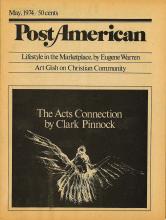The second annual Calvin Conference on Christianity and Politics, held April 19-20, 1974, on the college’s Grand Rapids campus, was another step in the process of evangelical consciousness-raising and deliberation in the new evangelical quests for meaningful forms of social and political engagement. More than 300 participants attended the gathering, which was the first major event since the much-discussed Thanksgiving Workshop that produced The Chicago Declaration of Evangelical Social Concern (Post-American, January '74). The declaration, regarded as having “historic” importance by the press, has received a wide and enthusiastic response from many quarters.
Many of the original signers of that declaration point out that evangelical opposition to economic and racial injustice, to war and global violence, to exploitive affluence, and to the hypocrisy of civil religion sound “new” only because of the ethically crippling political and cultural conformity that has infected the evangelical churches for so long. Again at Calvin, the desire for biblical rootage and for continuity with the evangelical tradition was strong among the participants. In his presentation, Richard Mouw expressed the concern that “ ... in our quest for new forms of socio/political engagement today, we must not be thought of as siding with Protestant liberalism, but rather as expanding the evangelicalism that nurtured us and brought us to a saving knowledge of the Lordship of Jesus Christ.”
Read the Full Article

